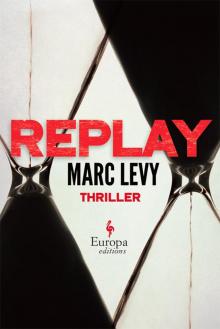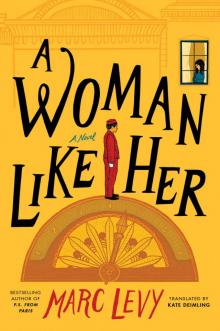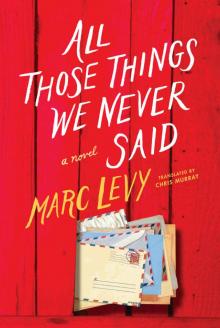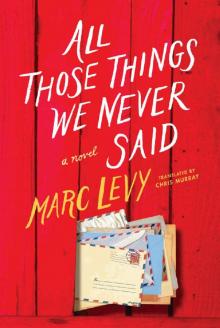A Woman Like Her Read online
Page 2
“Where will he sleep?”
Lali glanced down the hallway.
“Out of the question!”
Deepak put down his napkin, walked across the living room, and opened the door to the blue room. He had painted it that color three decades earlier. Taking apart the crib he had made with his own hands had been the most painful experience of his life. Ever since, he entered that room only once a year, to sit down in the chair he had placed near the window and offer a silent prayer.
When Deepak saw how his wife had transformed the room, he was at a loss for words.
Lali put her arms around him from behind.
“A bit of youthful energy could do us some good.”
“So when does this nephew of yours arrive?” asked Deepak as the intercom buzzed.
Waiting for her guest in the doorway of the apartment, Lali adjusted her sari and ran her hand over her hair, which she wore in a bun secured with an ivory comb.
The elevator door opened, and Sanji stepped out wearing jeans, a white shirt, a tailor-made jacket, and stylish sneakers.
“You don’t look the way I imagined,” Lali said, a little embarrassed. “Please make yourself at home.”
“We’ll see about that,” grumbled Deepak from behind her. “I’ll make some tea for our passing guest while you go change.”
“Don’t listen to this grumpy old man,” she cut in. “Deepak is making fun of my outfit. I didn’t know what kind of man would knock at our door. Our family was always so conservative.”
“India has changed a lot. You were expecting me?”
“Of course I was expecting you.” Lali sighed, gazing at him. “You look so much like him. It’s like seeing my brother again after forty years.”
“Don’t bother him with those old stories, he must be exhausted,” Deepak said, leading the guest to the dining room.
When Lali came back after swapping her sari for pants and a blouse, she found the two men seated at the table making polite conversation with noticeable effort. She put out some cookies, asked her nephew if he’d had a good flight, and listed all the places that she wanted to show him. Lali tried to make up for her husband’s quietness. Sanji waited for the moment when he could leave without being rude. He stifled a yawn, which gave Deepak an opening: it was high time everyone went to bed.
“Your room is ready,” Lali announced.
“My room?” repeated Sanji.
She took her nephew by the hand and led him to the blue room. Sanji studied it warily.
On the corduroy-covered sofa bed, Lali had spread out orange sheets and placed two flowered pillows and a handmade patchwork quilt. She had also commandeered the table from the entrance to use as a makeshift desk and adorned it with a terra-cotta pot full of paper flowers.
“I hope you like it. I’m so happy to have you stay with us.”
She closed the curtains and said good night.
Sanji looked at his watch. It was 8:15. The idea of sacrificing a junior suite at the Plaza with a view of Central Park for an eight-by-eight room in Spanish Harlem horrified him, and he wondered how he could extricate himself from this sticky situation without offending his aunt. Finally, a prisoner of propriety and with a lump in his throat, he called the limo driver to say that he no longer needed his services. As he heard the sofa bed creak beneath him, his thoughts turned to the king-size bed that should have been his.
At 12 5th Avenue, Chloe opened the door to her 2,700-square-foot apartment. She put her keys on the entryway table and gazed at the photos in the hallway as she passed. The walls were practically a gallery of her life. She liked some of the pictures, such as the one of her father at age thirty, with his thick hair and his Indiana Jones look that used to drive her high school girlfriends crazy. But she hated the one where she was receiving a medal after a race in San Francisco, because her mother looked so sour-faced. (She would pack her bags and leave the next day.) And she felt nostalgic about the picture of the dog who was once part of the family, back when she and her parents were still together.
A ray of light came from the office. She entered silently and watched her father. His oncered hair was as thick as ever, but its color had turned to ash. Bent over his desk, Professor Bronstein was grading papers.
“Did you have a good day?” she asked.
“Teaching Keynesian economics to a bunch of zit-faced kids is more fun than it sounds. How was your audition?” he asked without looking up.
“I’ll find out in a few days if I get a callback.”
“Aren’t you having dinner with Schopenhauer?”
Chloe looked at her father and moved back toward the door.
“Would you like to go out to dinner, the two of us? I can be ready in half an hour,” she said as she left.
“Twenty minutes!” he called after her.
“That’s how long it takes just to fill the bathtub. I’ll be on your schedule if you ever get the plumbing fixed!” he heard from afar.
Professor Bronstein opened a drawer and dug through his papers until he found an old repair estimate. He sat back in dismay when he read the amount. He put it back and immersed himself in grading papers until Chloe knocked on his door decidedly more than half an hour later.
“I called Mr. Rivera, let’s go.”
Mr. Bronstein put his jacket on and joined his daughter on the landing. The elevator gate was already open. Chloe entered first, and her father followed.
“Deepak said you weren’t going out tonight,” the elevator operator said almost apologetically.
“Change of plans!” Chloe said cheerfully.
Rivera turned the handle, and the elevator began to descend.
On the ground floor, he slid the gate open and moved out of the way to let Chloe go by.
Outside, the sky was midnight blue, the temperature mild.
“Let’s go to Claudette’s,” suggested the professor.
“We can’t take advantage of their generosity forever. Someday we’ll have to pay our tab.”
“Not forever, but we can do it a little bit longer. You should be happy—I finally paid the grocer today.”
“How about Mimi’s? My treat.”
“Did you hit your mother up for money?” Mr. Bronstein asked in a worried voice.
“Not exactly. I did go visit her. We were supposed to spend some time together, but she was busy packing. Her gigolo is taking her to Mexico. Well, actually, she’s taking him. So, to make herself feel better, she handed me some cash and told me to go buy some new clothes.”
“Maybe you should have.”
“She hates my taste in clothes. Whereas you and I share the same taste for French cuisine,” she said, heading down the street.
“Not so fast, I’m on foot, you know!” Mr. Bronstein protested. “And stop calling Rodrigo that, they’ve been living together for fifteen years.”
“He’s twenty years younger than she is, and he lives off her income.”
Passing Washington Square Park, they turned down Sullivan Street. Inside the entrance of Mimi’s, the hostess welcomed them, loudly announcing that their table was ready, even though ten customers were sitting at the bar waiting to be seated. As regulars, they were entitled to certain privileges. The professor slid into the booth while the waiter removed the chair across from him to make room for Chloe’s wheelchair. She turned toward a couple who had not stopped staring at them.
“It’s a Karman S-115, a limited edition. I highly recommend it, it’s very comfortable and easy to fold,” she said before turning to join her father.
“I’m having the gnocchi à la Parisienne, what about you?” he asked tensely.
Chloe chose the French onion soup and ordered two glasses of Pomerol.
“So who stood up whom?” asked Mr. Bronstein.
“What are you talking about?”
“This morning, you said you’d be back late, and I heard you rummaging around in your closet for quite a while.”
“I was going to go out with the girls, but
after the audition, I was so tired that—”
“Chloe, please!”
“Julius is really busy, so I suggested we do it another night.”
“Being a philosophy professor with the name Schopenhauer is a real cross to bear, I’m sure.”
“Could we please change the subject?”
“Whatever happened to that patient of yours? As I recall, her boyfriend took her for granted. You said his behavior made her unhappy, but also, paradoxically, made her happy at the same time.”
“That isn’t exactly what I said. It’s kind of like Stockholm syndrome. She thinks she’s so worthless that she feels grateful for the love he gives her.”
“Didn’t you tell her to leave him for someone better?”
“My job is simply to listen to my patients and help them become aware of what they’re expressing.”
“Did you find a solution to her problem, at least?”
“Well, I’m working on it—I’m teaching her to expect more, and she’s making a lot of progress. But if you’re trying to tell me something, please just come out and say it.”
“Just that you should expect as much as any other woman.”
“That’s your way of changing the subject? I think you have overprotective-father syndrome.”
“Maybe you’re right. If only I could have consulted you before your mother left me … but you were only thirteen,” the professor said with a sigh. “Why do you run around from one audition to the next when you’re so good at what you do?”
“Because I’m just starting out as a therapist. I only have three patients, and we have no money.”
“It’s not up to you to support us. If all goes well, I’m about to clinch a lecture series that will get our finances back in shape.”
“But you’ll be away all the time and you’ll be exhausted. It’s time for me to be independent again.”
“We should move. That apartment is too expensive for us.”
“No way. I put my life back together again in that apartment twice, once when we left Connecticut and again after my accident, and besides, I want you to be able to grow old there.”
“I’m afraid I’m already old.”
“You’re only fifty-seven, and those people watching us think we’re a couple.”
“What people?”
“At the table behind me.”
“How do you know they’re looking at us?”
“I can just tell.”
Chloe and her father often ended their evenings out with a private game. They looked at each other without speaking, and each had to guess what the other was thinking through facial expressions and head movements alone. The people around them always noticed these subtle exchanges. It was one of the few times Chloe liked being watched, when she knew people were looking at her instead of her wheelchair.
3
The floral organza curtains barely blocked the morning light, which awakened Sanji at dawn. For a moment, he didn’t know where he was, but then he was reminded by the pink and blue of the room. He buried his head under the pillow and went back to sleep. He woke suddenly a few hours later, grabbed his cell phone from the nightstand, and jumped out of bed. He dressed hastily and left the room, his hair sticking up all over.
Lali was waiting for him at the kitchen table.
“So, do you want to go to the Met or the Guggenheim? Or maybe you’d like to walk around Chinatown, Little Italy, Nolita, or Soho? We can go anywhere you like.”
“Where’s the bathroom?” he asked in a daze.
Lali pointed down the hall, obviously disappointed.
Sanji returned a few minutes later, his hair combed.
“Have some breakfast,” Lali ordered.
Sanji sat down on the chair that Lali had pushed back with her foot.
“Okay,” he agreed. “But something quick, I’m running late.”
“What kind of work do you do, if I may ask?” she asked as she poured milk into a bowl of cereal.
“I work in the tech world.”
“What does that mean, exactly?”
“We design new technologies that make people’s lives easier.”
“Could you design a nephew for me who would spice up my routine? Someone I could go for a walk with, someone who would tell me about my country or give me news of my family, whom I haven’t been in touch with for so long?”
Sanji got up and kissed his aunt on the forehead.
“I promise,” he said, embarrassed by his own spontaneous show of emotion. “As soon as I can, but I really have to go to work now.”
“Okay, get going, I’m already getting too used to you being here. And just so you know, it’s out of the question for you to stay anywhere except under my roof while you’re in New York. I’d be extremely annoyed. You wouldn’t dream of offending a member of your family, would you?”
With no other choice but to leave his suitcase behind, Sanji left the apartment.
It was a beautiful spring day to see Spanish Harlem for the first time. He took in the colorful store windows, crowded sidewalks, and packed streets with car horns blasting. The only things missing from this mayhem were the rickshaws. A twenty-hour flight just to be teleported into a Puerto Rican version of Mumbai! Before going down into the subway, he sealed his fate by calling the Plaza to cancel his reservation.
Since his aunt had left, India had modernized in many ways. But some traditions stuck—respecting your elders was still nonnegotiable.
Sanji got off the subway at West 4th Street, already late for his meeting. As he walked along the iron fence of Washington Square Park, he heard a melody. Instead of going around the park, he crossed through it, like a child following the Pied Piper, and came upon a musician playing the trumpet. The notes rose up among the branches of the linden and catalpa trees, the Norway maples, the Chinese elms. Twenty or so people had gathered around the performer. Sanji came closer and sat down on a bench, completely under the music’s spell.
“This will be our song. You’d better not forget it,” a young woman whispered nearby.
Surprised, he turned his head.
“There’s always some melody when two people meet,” she added playfully.
She was radiant.
“I’m joking. You looked so mesmerized—it was very sweet.”
“My father was a wonderful clarinet player. ‘Petite Fleur’ was his favorite song—he played it all the time when I was little.”
“Feeling homesick?”
“I’m all right, I haven’t been here very long.”
“Did you travel far?”
“From Spanish Harlem, just a half hour away.”
“Touché—we’re even,” she replied with a smile.
“I’m from Mumbai. And you?”
“I live on that corner.”
“Do you come here often?”
“Almost every morning.”
“Maybe we’ll see each other again. I’ve got to run.”
“Do you have a name?”
“Yes.”
“Nice to meet you, Yes. I’m Chloe.”
Sanji smiled and waved, and went on his way.
The building where Sam worked was on the corner of West 4th Street and MacDougal, along the southern side of the park. Sanji went up to the desk, and the receptionist asked him to wait a moment.
“You haven’t changed at all,” Sanji exclaimed upon seeing his friend.
“Neither have you, just as punctual as always. They don’t do wake-up calls at the Plaza?”
“I’m staying somewhere else,” Sanji answered nonchalantly. “Let’s get to work!”
Sam and Sanji had met fifteen years earlier at Oxford. Sanji was studying computer science; and Sam, economics. England had seemed more foreign to Sam, an American, than it had to Sanji.
When he returned to India, Sanji founded a successful company. Sam moved to New York and worked as an account manager at an investment firm.
Their friendship continued over e-mail, and they were in touc
h regularly, so when Sanji got the idea of raising money in the United States to expand his company, he called on Sam. Sanji hated talking about money, which was somewhat inconvenient for an entrepreneur.
The morning was devoted to developing the materials they would give to potential investors. The numbers projected were tantalizing, but Sam thought Sanji’s presentation was unclear, and he kept interrupting him.
“You’re way too vague and off topic. The investors have to see you as a long-term partner, not just an app designer, however brilliant. They’re fantasizing about India.”
“What, do you want me to wear a turban and roll my r’s to seem more exotic?”
“It would be more stylish than jeans and a wrinkled shirt. America is full of software developers. Your social network has hundreds of thousands of users in Mumbai alone—that’s what the investors will be excited about.”
“Maybe you should do the presentation. You seem to know what to say and what not to say better than I do.”
Sam studied his friend. Sanji was from a wealthy Indian family. Sam’s parents owned a hardware store in Wisconsin, and he had gotten through school on scholarships and loans that he had only recently paid off.
Pulling off this deal would prove to his boss that he could handle big projects, and he might even be made a partner.
Sam was pragmatic, and he wasn’t jealous of Sanji—in fact, he admired him. But he fully intended to use Sanji’s family’s reputation to attract his clients, even if his friend had noble reasons for not wanting to rely on it.
“Sure, why not? In college, I always got better grades than you on oral exams,” Sam said.
“If classes had been in Hindi, things would have been different.”
“Who knows? Go take a walk. When you get back, I’ll do the presentation for you, and you can see if I’m more convincing than you are!”
“When should I be back for this marvelous performance?”
“An hour, tops.”
Leaving the building, Sanji found himself walking alongside the park. The trumpet player had gone, and with it the melody. He called his aunt and asked her to lunch.

 P.S. From Paris (US Edition)
P.S. From Paris (US Edition) Replay
Replay The Strange Journey of Alice Pendelbury
The Strange Journey of Alice Pendelbury A Woman Like Her
A Woman Like Her All Those Things We Never Said
All Those Things We Never Said All Those Things We Never Said (US Edition)
All Those Things We Never Said (US Edition)